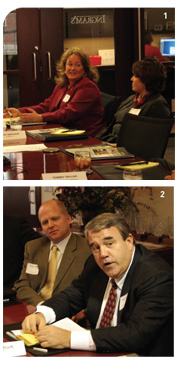
1: Lori Gregory, of Lewis, Rice & Fingersh, forecasts the fate of the federal estate tax. UMB’s Dana Abraham looks on. | 2: Merrill Lynch’s Brewster Ellis makes a point about the need to take a holistic approach to clients’ needs. Steven Toomey of BKD Wealth Advisors listens
attentively.
The Estate Tax
The question was raised as to how wealth managers advise clients on estate planning in an election year when half of the viable candidates want to kill the estate tax and the other want to revive it.
“I tell them my opinion,” said Tommy Taylor, an attorney with Shughart Thomson & Kilroy. “I don’t think it will change. They have got to have 60 votes in the senate. I don’t think it’s going to happen.”
As Taylor explained, the exemption for the estate state tax is now $2 million per person this year, $3.5 million next year. As planned, the estate tax goes away fully in 2010 to be replaced with a one-year carry-over basis.
“I don’t care who gets into office,” said Taylor. “I don’t think politically they can do anything other than main-tain the three and a half million dollar exemption.”
Right now the estate tax is 45 percent. “That’s a pretty tough hit for people who have to pay it,” noted Lori Gregory, an attorney with Lewis, Rice & Fingersh.
Although the exemption could revert back to a million dollars a person, few commentators think that is going to happen. Gregory added that most observers believe that we will end up with an exemption in the $3.5–$5 million range with a reduction in the rate of tax beyond that.
“I think you will see a big swing towards keeping the death tax in some form,” added Bob Mulleedy with Haake Companies. “[Congress] will need the dollars from it.”
Brewster Ellis with Merrill Lynch is confident there will be a change in the law but is less confident as to the nature of that change. “What we tell people is that though it may be a death tax,” said Ellis, “there still better be a living document.”
As Tommy Taylor of Shughart Thomson & Kilroy observed, two major industries that will fight the elimination of the estate tax are life insurance and philanthropy. “Let’s face it,” he added, “tax is not just for revenue. It is social policy.”
The Year Ahead
Participants were asked how they manage client expectations in a potentially down year.
“I think it goes back to how you’ve dealt with clients since the beginning,” said Brewster Ellis. He noted that many of those at the table approach their business from a holistic perspective. “That means we spend a great deal of time getting to know our clients,” said Ellis. “We are able to anticipate in a market like this how they are going to feel and the questions they are going to ask.”
As Stewart Koesten with KHC Wealth Management Services explained, most client portfolios are built to withstand recessions. The clients are already mentally prepared to cope with periodic down markets. Where Koesten finds most difficulty is in a surging marketplace: “Clients then are chasing returns and are looking for constantly higher, better, cocktail party returns. That is far more dangerous for them.”
“Every one knows volatility in an up market,” countered Bob Rippy with Robert W. Baird & Co. “No one knows volatility in a down market.” As he explained, even well counseled clients don’t always understand the risk factors as they relate to their own investments.
(...continued)